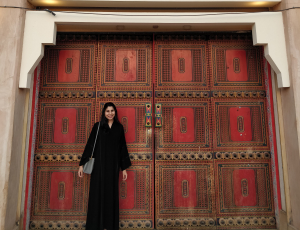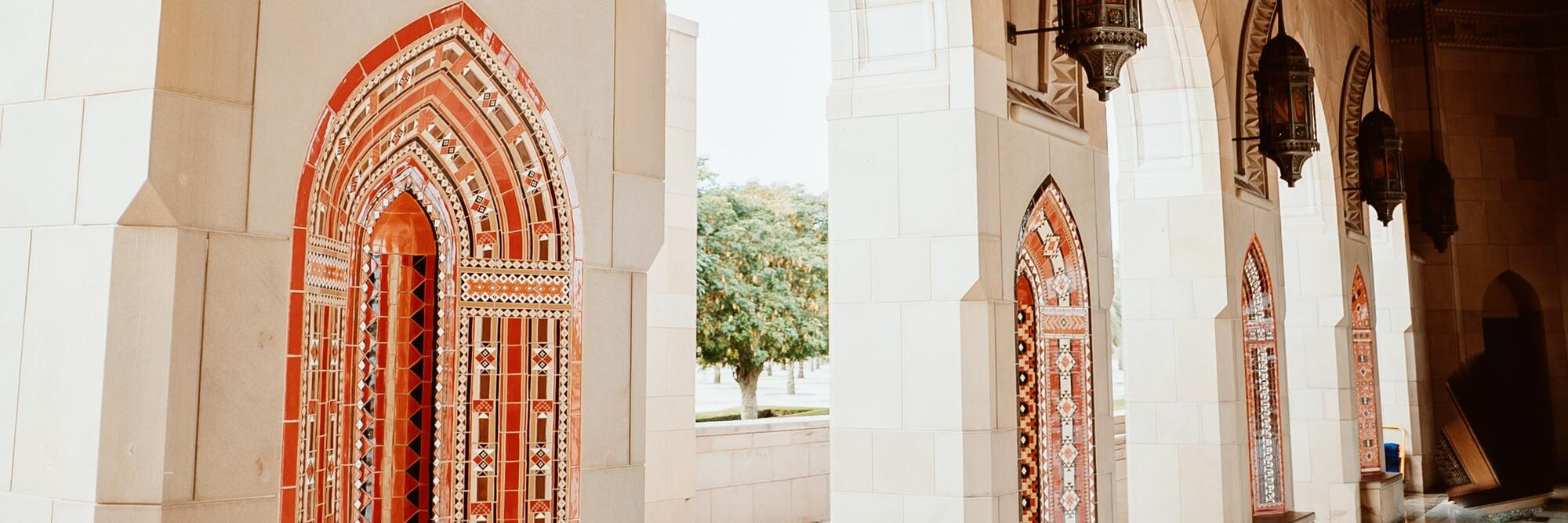An Interculturalist by profession and an avid traveller, Palavi Kele moved to Riyadh, Saudi Arabia with her husband after their wedding in 2019. She's passionate about learning languages, blogging about her travels and cultural adventures, and collecting postcards from across the world. Palavi shares her stories about life in Saudi Arabia, and Riyadh in particular, on her blog. She can also be found on Twitter.
Read more about expat life in Saudi Arabia in our Expat Arrivals Saudi Arabia country guide.
About Palavi
Q: Where are you originally from?
A: I’m from Pune, India.
Q: Where are you currently living?
A: Riyadh, Saudi Arabia (KSA)
Q: When did you move here?
A: June 2019
Q: Is this your first expat experience?
A: Yes. Apart from having lived in London as a student (sojourner).
Q: Did you move here alone or with a spouse/family?
A: With my husband.
Q: Why did you move; what do you do?
A: “I’m taking up a job in Riyadh”, he said and then we moved here earlier this year. I’m currently looking for a part-time role in teaching cultural sensitization or English language and for any intercultural training opportunities with global companies.
Living in Riyadh
Q: What do you enjoy most about Riyadh? How would you rate the quality of life compared to your home country?
A: I enjoy the peace and calm compared to the organised chaos in my home country, India. The quality of life is better in Riyadh.
Q: Any negative experiences? What do you miss most about home?
A: I wouldn’t call them negative experiences but ‘challenges’ that I encountered in my early days – It can be tricky to go around the city if you don’t have a personal car as all the stand-alone stores are far off unlike the ones in India, where you could walk to a general store and pick up 10 items ranging from a toothbrush to a bag of crisps to a greeting card!
Q: What are the biggest adjustments you had to make when settling into expat life here? Did you experience any particular elements of culture shock?
A: The biggest culture shock was the weather. Landing in a desert at the peak of summer wasn’t the best idea! The heatwave was at a whole new level and it did take me a while to adapt to the temperature difference. Having said that, the weather only got better through the next couple of months and I could say to myself “I’m prepared to take on the worst”. Landing in summer was also a bit challenging as most expat families (in our gated community- the compound) were away visiting their homes and the place seemed even more deserted.
Another interesting (and a cultural aspect that requires some amount of adjustment) is the prayer timings that occur four times during the day. During this time, public places including stores, restaurants and markets will be shut for about 30 minutes. So, it's crucial to work around those timings and plan to step out accordingly. I missed keeping track of it once and landed in a café for lunch after having skipped breakfast – the staff was kind enough to let us in but wouldn’t even serve us drinks or water until the end of prayer time slot was over. Lesson learnt. Since the prayer timings differ slightly every day, it’s best to download a local mobile app to keep track.
Q: What’s the cost of living compared to home? Is there anything particularly expensive or particularly cheap in Saudi?
A: On average, the cost of living is higher than in India with respect to clothing, grocery items (most are imported and hence differ drastically in prices), eating out and local transportation. However, electronic items tend to be cheaper with regular discounts around the year.
Q: How would you rate the public transport in Riyadh? What is your most memorable experience of using the city’s transport system?
A: Sadly, there is no public transport in Riyadh. The locals drive or get driven around in their personal cars and one can use Uber or Careem cabs to get around the city. However, the Metro work seems to be in full swing and should be up and running in the next couple years.
Q: How would you rate the healthcare in Riyadh? Have you had any particularly good/bad experiences with regards to doctors and hospitals? Are there any hospitals you would recommend?
A: My husband and I have had a good experience with Elite Hospitals. Their service for my Medical Tests required for Iqama was very efficient.
Q: What are the biggest safety issues facing expats living in Riyadh or Saudi Arabia? Are there any areas expats should avoid?
A: Riyadh is a very safe city and I personally haven’t had any bad experiences so far. I have independently taken cabs and even been driven by women at times.
Q: How do you rate the standard of housing in the city? What different options are available for expats?
A: Compounds are an ideal option for expats in my opinion. Most outside rules don’t apply (e.g. women don’t need to wear the national garb Abaya and public displays of affection is okay.)
Q: Any areas or suburbs you’d recommend for expats to live in?
A: Al Wadi, Kingdom Compound, Qurtubah
Meeting people and making friends
Q: How tolerant are the locals of foreigners? Is there obvious discrimination against any particular groups? Have you ever experienced discrimination in Riyadh
A: I personally have not experienced any discrimination in Riyadh. The locals are friendly and willing to help. One such instance was when my husband and I had to step out of the visa office during prayer time, most other local applicants sat back into their airconditioned cars to avoid the blistering heat. Since we had just moved to Riyadh, we were Uber-ing it around the city and didn’t have a choice but to stand outside the entrance gate. A kind Saudi national in his Thobe approached us and offered to let me sit in his car along with his wife and kids.
Q: Was meeting people and making friends easy? How did you go about meeting new people?
A: As I arrived during peak summer, I missed meeting fellow residents in our compound as most of them travelled back to their home countries for long vacations. My only friends were my husband’s colleague and his spouse. I made a Mexican friend through an uncanny coincidence on a ‘City Walking Tour’ in Prague, Czech Republic! Having lived in Riyadh for over 3 years, she introduced me to her friends and that’s how I got introduced to a multicultural group of expats. Events in our compound (gated community) helped make new friends from diverse cultural backgrounds and I also made some local friends at my Arabic language class.
So, yes, it was a bit difficult initially, but once I did make a couple friends, I got introduced to a whole pool of expat community and the city proved to be a great platform to meet people from across the world.
Q: Have you made friends with locals or do you mix mainly with other expats? What advice would you give to new expats looking to make friends with the locals?
A: The workplace is an ideal place to make friends (locals and expats). However, as mentioned in my earlier answer, if you are sociable and the timing of your arrival in the country is right, it’s easy to make friends in the compound, through events (e.g. Riyadh Language Exchange and travel clubs like Riyadh Hiking Club). I do have a couple of local friends I got introduced to in my Arabic language class and through common friends.
Working in Riyadh
Q: Was getting a work permit or visa a relatively easy process? Did you tackle the visa process yourself, or did you enlist the services of an immigration consultant?
A: It depends on your nationality and the efficiency and contacts your company has in order to pace up the visa process. We did seek assistance from a Saudi immigration certified visa agent back in India. With the recent changes in initiating tourist visas for over 50 country nationals, the overall visa process seems to have eased compared to a year ago.
Q: How does the work culture differ from home? Do you have any tips for expats doing business in Riyadh or Saudi? Did you have any particularly difficult experiences adapting to local business culture?
A: Unlike a couple years back, women now hold managerial roles (and even senior positions) in many organisations, and it’s good to know the social and business protocol while working with them so as to not come across as disrespectful.
Family life in Riyadh
Q: Do you think there are any specific challenges for a trailing spouse?
A: A previously employed trailing spouse (like myself) may find it challenging to be cooped up at home. But there are several ways to keep yourself occupied and engaged without hampering your personal growth while on the job hunt. Learning the local language, taking up art workshops, getting involved with local sports communities or adventure or hiking clubs, attending events, travelling, exploring the local markets and learning about the Saudi culture.
Q: What are your favourite family attractions and activities in the city?
1. Cliched as it may seem, mall visits to get weekly groceries, is a nice way to see more faces as one tends to be cooped up at home to avoid the extreme weather. Most malls have activities for kids/a play area, bowling arena, VR games, etc.
2. Parks – Olaya, Ad Diriyah historical district, King Abdullah Park and many more
3. The National Museum of Saudi Arabia
4. Riyadh Season events (Nov, Dec, Jan) like the Winter Wonderland
Q: What are the schools like, any particular suggestions?
A: Since I do not have kids of my own, I’m unable to provide details. However, I’ve heard there are a few good international schools (French, British, American and so on).
Final thoughts
Q: Is there any advice you would like to offer new expat arrivals to Riyadh or Saudi?
A: Through the years, Saudi Arabia has been subjected to lazy stereotyping. It’s important to be open to the move and as frivolous as it may sound, a lot is based on that positive approach. The country is under cultural transformation for the better with liberal laws, especially for expats living in Riyadh (which has traditionally been more conservative compared to cities like Jeddah and Dammam). In my opinion, it’s an ideal time to live in Riyadh to be able to experience this interesting cultural transition.
► Interviewed November 2019



